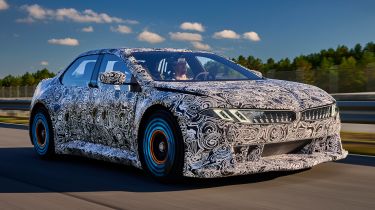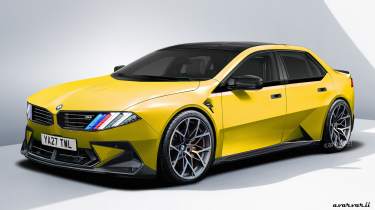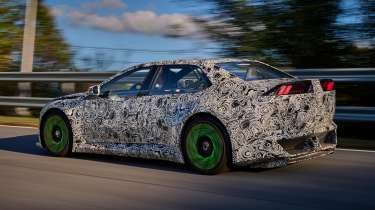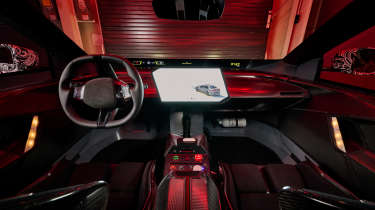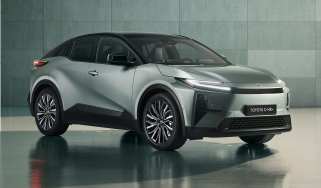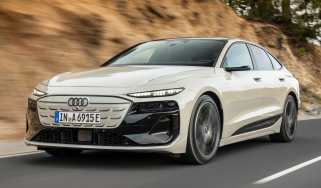New BMW M3 super-saloon goes electric – we ride in a prototype
Next-gen M3 will use a cutting-edge quad-motor EV setup, but petrol isn’t dead yet
- Next-generation BMW M3 to get petrol and EV versions
- Electric M3 to use four electric motors
- Both due to arrive in 2027
Performance car purists, cover your ears – the BMW M3 is going electric. The car industry’s shift away from petrol power hasn’t spared one of the world’s most iconic sports saloons, which will trade pistons and petrol for batteries and motors in 2027.
But that’s not quite the full story, as BMW has confirmed that an all-new petrol-powered M3 will be sold alongside the EV as well, leaving buyers with a tricky decision to make. Both are still in the development stage, but we’ve snapped a couple of camouflaged test mules and we’ve even had a ride in an electric M3 prototype. Called the BMW Vision Driving Experience, the electric M3 looks to be very promising indeed from this first impression.
Both the petrol and electric M3 will be based on the new BMW 3 Series, sharing its ‘Neue Klasse’ design and cabin. Of course, we expect the M3 to get a suitably sporty makeover, with swollen wheelarches, chunkier bumpers and bigger wheels, as shown in our exclusive preview image.
What do we know about the electric BMW M3?
Up until now, the BMW M3 has always used a petrol engine, with the current model getting a 523bhp twin-turbocharged 3.0-litre straight-six. By offering an electric option, too, BMW can cater to more buyers while unlocking a new level of performance to rival today’s fastest EVs. With cars like the BMW i4 M50 and i5 M60, BMW has proved that it knows how to make a rapid EV, but the next-generation M3 has the potential to take things much further.
For starters, the electric M3 – possibly called the iM3 according to a recent trademark application – will use four electric motors, with one for each individual wheel. We can see M-coloured graphics around each wheel in these spy shots of the iM3 in testing, hinting at its four individually driven wheels. It’s a setup that will probably set the iM3 apart from the regular electric 3 Series, which is expected to use either a single or dual-motor configuration.
Of course, with a big battery and four electric motors, the iM3 is likely to be a lot heavier than its petrol-powered twin. A senior official within the M3 project suggested that it could weigh between 400kg to 500kg more than the petrol version, but that will be offset by a healthy increase in power.
Head of BMW’s M division, Frank van Meel, confirmed that its Neue Klasse quad-motor platform has been designed to produce up to 1,341bhp at its peak, using a new “Heart of Joy” ECU (engine control unit) that oversees the stability control, powertrain, battery and chassis software in one package.
“It means you can drive this car in a way you never have before,” he explained.
However, we expect the 1,341bhp figure to be reserved for BMW M’s heaviest models, like the XM SUV, with the iM3 getting a detuned version of the system. Van Meel went on to explain that BMW’s electric M cars won’t be just about outright power, saying the focus is still “all about vehicle dynamics, the overall vehicle concept”. He also didn’t reject the idea of a simulated gearshift system in the iM3, which we first saw in the Hyundai Ioniq 5 N.
“If you have just one gear and you have no feedback at all, you don’t know how fast you are going and you cannot look down at the speed,” Weber explained. “You should always know how fast you are going, and that’s missing if you have no acoustic feedback and no haptic feedback. We are looking into different ways of giving you that.”
First ride in the BMW Vision Driving Experience – Ellis Hyde
BMW recently invited us to take a look at its latest electric prototype, called the Vision Driving Experience. While not explicitly an electric M3 prototype, the Vision Driving Experience (or VDX as we’ll call it for short) has been created to test and develop BMW’s quad-motor electric platform and its supporting software, all of which will feed into the new M3.
It even looks like an M3. It sits barely off the tarmac with big, swollen arches to house its wide wheels, while aggressive bumpers and side sills complete the racecar costume. The front-end design draws heavily from BMW’s Neue Klasse saloon concept and we expect the production version to look very similar. At the rear, the tail-lights are mounted high and integrated into the bootlid spoiler.
There are a few things that are unlikely to make it to showrooms, however. The VDX uses a series of fans under the body to generate downforce to help it stick to the road – up to 1,200kg of the stuff. It’s deafeningly loud, so we don’t think this will be missed from the production car.
What’s more obvious are the illuminating wheels – they glow green under acceleration, blue when recovering energy and orange when the brakes are being used. BMW says this is so the engineers are able to see what the car is doing when being tested, but unfortunately, they won’t be fitted to the final car.
Those lights do confirm earlier suggestions, though. The electric M3 will be four-wheel drive, with an electric motor for each individual wheel. As mentioned before, the four electric motors have the potential to deliver up to 1,341bhp, but the production car is unlikely to get a figure quite that large. The VDX prototype’s 18,000Nm of torque – 10 times more than a Bugatti Chiron – is also likely to be restricted for the real electric M3.
The real focus of the VDX prototype is to hone BMW’s new “Heart of Joy” computer, which manages the electric motors, driving dynamics, steering, vehicle stability and even charging in one single package. It’s said to be 10 times faster at processing data than current systems that use multiple computers.
There will be tangible benefits for drivers, with one of BMW’s driving development experts, Christian Thalmeier, suggesting that the smoothness of the powertrain will be a key highlight. The electric platform allows the VDX to come to a complete stop through regenerative braking, with no need for the friction brakes. When braking from above 90mph, the physical brakes will come into play, but for most day-to-day driving, Thalmeier suggests it will be so smooth that you won’t be able to feel it coming to a standstill.
During our brief passenger ride in the VDX at BMW’s Performance Centre in South Carolina, we were impressed by how well-built the interior was for a prototype. It featured a working version of BW’s new Panoramic iDrive system – which will feature in the production car – along with an unusual four-spoke steering wheel.
Our chauffeur for the day, BMW M Motorsport works driver Jens Klingmann, was keen to demonstrate the VDX’s dynamic abilities. Even through fast turns it remained unnaturally flat, with the back beginning to step out as speed increased, creating a sensation of gliding out of long, sweeping corners. Switching to ‘drift’ mode cuts the traction and stability control, allowing Klingmann to perform a tyre-shredding four-wheel burnout along the main straight.
The straight-line performance is clearly abundant, but what’s more exciting is how the VDX’s four motors can operate both incredibly smoothly or savagely, depending on how you want to drive it. If this prototype is anything to go by, the electric M3 could be the most exciting M3 yet.
What about the petrol BMW M3?
While the electric M3 is grabbing headlines, BMW hasn’t forgotten about petrol power. We don’t have official confirmation of what engine will lie under the bonnet of the new M3, but BMW’s Head of Development, Frank Weber, explained that the current 3.0-litre straight-six has been designed to comply with upcoming Euro 7 emissions regulations when fitted with mild hybrid tech.
That would allow the engine to meet emissions standards beyond 2027, meaning it could be fitted to the new M3. There’s still no official word on whether BMW will go down this route, but we do know that it won’t be fitting the M3 with a smaller engine than before – like Mercedes did with the latest 2.0-litre AMG C 63.
The new M3 will also get a new cooling setup for the engine, which will help cut weight significantly. It’s been suggested that the overall weight figure for the new M3 could be as low as 1,500kg – a whole 350kg less than the current model. In terms of performance, the new M3 is unlikely to be as powerful as the latest BMW M5, which uses a plug-in hybrid system with a big electric motor. Instead, we expect the new M3 to use a less-substantial mild hybrid system with a total power output similar to the current car – perhaps around 550bhp.
When will the new BMW M3 arrive?
Both the electric iM3 and petrol M3 are scheduled to be fully revealed in 2027, following the debut of the Neue Klasse 3 Series in 2026. UK sales are likely to kick off a year later in 2028, with confirmation of UK specs and pricing before then.
Find out about the latest M models, including the BMW M2 and the BMW M4…
Recommended
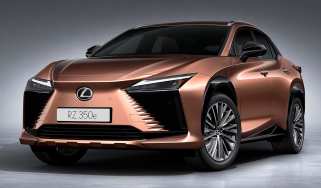
New Lexus RZ finally gets groundbreaking steer-by-wire tech in the UK
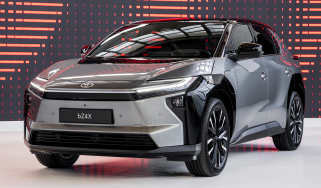
New Toyota bZ4X arrives with big range and power boosts
Most Popular
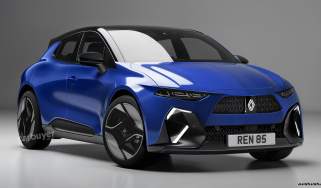
New Renault Clio to lean into “future icon” design, but EV version off the table
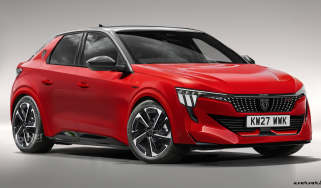
New Peugeot 208 coming soon with hot GTi version under consideration
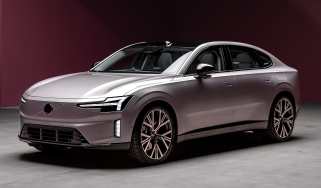
New Volvo ES90: flagship electric saloon unveiled with 435-mile range
Tips & advice

Car dashboard warning lights: what does each symbol mean?

Electric car charging stations: public networks, charger types, apps and maps

